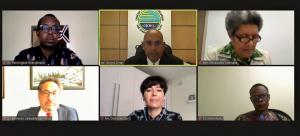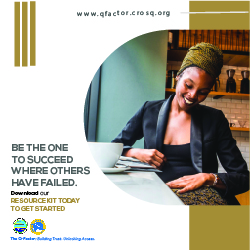After COVID19…What?
- crosqblog
- on Jul, 08, 2020
- Category Conformity Testing, Cooperation, Demand for Quality, Food Safety, Quality Management Systems
- No Comments.

The COVID19 pandemic has revealed the benefits of working collaboratively, says CROSQ CEO, Mr. Deryck Omar.
This view was shared as he addressed the United Nations Industrial Development Organization’s forum “Standards and Conformity Assessment Approaches in African, Caribbean and Pacific Regions: Fight Against COVID 19”, at the end of June 2020.

“Cooperation in quality infrastructure is really critical. It actually started long before COVID – the COVID just makes it even more important now,” he said, adding that regional cooperative mechanisms like the Caribbean Community (CARICOM), and its agencies like CROSQ could use this time to foster closer connections, especially when global marginalisation could be a challenge of the future.
“So when you look at those global challenges in the future, which may not come to pass, we do see increasing global marginalization for a lot of the small island development states like us in the Caribbean. So, in such circumstances, regional cooperation is even more paramount than it was previously, because no small island development states has the capacity or resources to do it themselves.
“And in the area of quality infrastructure, this process of regional cooperation has long started since the advent of [CARICOM, and then CROSQ’s formation] . . ., and especially in more recent times with the Regional Quality Policy that we developed and implemented and with some assistance from PTB, the German National Metrology Institute, and some new information and ideas coming out of UNIDO, which is really timely.
“With this advent of CROSQ, . . . it is helping us in the region to more learn how to cooperate, especially when we realize that it is only together we’re going to be able to survive these economic challenges in the future. And we have some great partners who’ve been helping us, like GIZ, PTB, the EU, the ACP, CDB, the British Standards Institute, ASTM, World Bank, CEN, and I’m really grateful for this assistance. And in the future, it will be become probably more important to get help from our partners.
“Now, in a nutshell, we see that responding to these international challenges of more maybe global contraction and more marginalization, regional cooperation is important and what will underlie regional cooperation is trust. And how do you demonstrate trust through quality infrastructure? You can’t bluff with quality infrastructure.
“So we see a demonstration of the use and harmonization of quality infrastructure between our islands as building trust. This trust is going to bring more regional cooperation and with more regional cooperation, we should be able to survive, probably tough times of the next five years,” he said.
It was also why the region was also placing more focus on quality promotions. While it is more of a social science than the other aspects of QI, he said this dimension, which correlates to some of the UNIDO principles such as inclusiveness, ownership, coherence and optimisation, building a better quality culture that was demand-driven from the individual level, could also see an increase in quality platforms which in turn will help build resilience.
“We want to show the people that quality is right, quality is accessible, and it is affordable now in this day and age. So quality promotions is another big thing for us apart from all the other physical sciences of QI, to really help build the trust and cooperative agenda of our region,” the CEO said.
He continued that he thought sectors like agriculture, agroprocessing, tourism, light manufacturing, mining and the extractive industries, and services, were among the ones most needing attention of QI experts now.
“Some of the measures that we have been applying specifically as a group of 15 bureaux of standards in the region, is that we have really been preaching that in an economic downturns it’s not the time to disinvest in your quality infrastructure. So you have to resist that temptation, and the more you can build a robust and evolving quality infrastructure in this time, it is more important, because then you can avoid costly private sector mistakes in quality when the private sector can least afford it; you can protect consumers, health and safety, when individuall these consumers are less able to protect themselves.
“You can protect consumers from substandard products and services; and you can also protect the environment with your quality infrastructure, because when times are difficult people often forget that the resources around them are not free, and therefore you need to use it in a constructive manner, and finally, in a general way there’s another reason you need to keep investing in quality infrastructure and that’s because you can’t transform your economy without it — you need standards, you need measurement infrastructure, you need laboratories. So, now is the time to ramp up your investment in quality infrastructure.”
In addition to quality promotions aimed at educating the various stakeholder groups, he said there was also a push to encourage companies to start investing in quality management systems as they designed and implemented new business models to meet changing times.
“In the areas of standards, we have a regional project afoot to adopt PPE [personal protective equipment] and other such protective standards from ASTM, ISO, and we have CARICOM Regional Standards in those areas ready to push, and also too, we have begun to accelerate the development of standards in tourism and health and hotel accommodations and beauty and the wellness sector and, most importantly, if we’re going to see a rebound in agriculture and agroprocessing as two primary opportunities. We’re putting a renewed focus on good agricultural practices (GAP), good manufacturing practices (GMP), and HACCP.
“In the areas of metrology [measurement infrastructure], the bureaux are encouraging their Ministries of Health to put more attention on the metrology and the calibration of their medical devices and measurements, and obviously accreditation of labs is taking our foremost perspective, especially in trade and in health. We have the Trinidad and Tobago Laboratory Accreditation Service and we have the ILAC-recognized Jamaica National Agency for Accreditation, who have been really pushing more with us in that regard to get our labs accredited or at least with good quality management systems.
“And finally we are pushing certification of food safety systems and standards, along with product certification now, but it’s quite a task trying to get more and more people to buy into the certification of products, but it comes naturally with food safety and food security now,” he stated.




